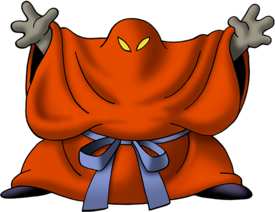Abracadabrer
Jump to navigation
Jump to search
| Dragon Quest monster | |
|---|---|
| Abracadabrer | |
| Japanese | デビルウィザード |
| Romaji | Debiruwizādō |
| First appearance | Dragon Quest III |
| Old localization | DevilMage |
The abracadabrer is a recurring monster in the Dragon Quest series, first appearing in remake versions of Dragon Quest III.
They are formerly human wizards who have sold their souls in exchange for their prodigious magical power.
Characteristics[edit]
Abracadabrers resemble prestidigitators but have ditched the grey robes for red with dark indigo belts tied around their waists. They have grey hands and yellow eyes glowing from their hoods. The abracadabrers are the highest ranking spellcasters of their order, and as such they are capable of using magic of immense power.
Appearances[edit]
Dragon Quest III: The Seeds of Salvation[edit]
| Sprite | Level | HP | MP | |
 |
63 | 350 | 255 | |
| Attack | Defense | Agility | Experience | Gold |
| 180 | 170 | 150 | 4,300 | 210 |
| Bestiary No. | #138 |
| Spell(s) | Kaboom Fullheal Kazing Oomph Fizzle Kasap |
| Skill(s) | None |
| Location(s) | Cloudsgate Citadel |
| Item Dropped | Prayer ring1⁄32 |
| Evasion | Fire Resistance * | Crack Resistance * | Woosh Resistance * | ||
| 0/64 | 25% | 25% | 25% | ||
| Zap Resistance * | Drain Magic Resistance | Whack Resistance * | Kamikazee Resistance | ||
| 0% | 100% | 100% | 25% | ||
| Poof Resistance | Dazzle Resistance | Fizzle Resistance | Fuddle Resistance | ||
| 70% | 0% | 100% | 100% | ||
| Snooze Resistance | Deceleratle Resistance * | Sap Resistance * | |||
| 70% | 0% | 0% | |||
Dragon Quest III HD-2D Remake[edit]
Dragon Quest XI: Echoes of an Elusive Age[edit]
Dragon Quest Monsters: Super Light[edit]
|
|
This article is a stub. You can help by expanding it. |
Template:DQRival[edit]
Abracadabrer appeared as a rare card exclusive for Demon Swordsman leaders in the 4th card pack, "Tales of Powerful Monsters".
Etymology[edit]
- Abracadabrer's name is derived from the term "abracadabra", an incantation used as a magic word in various tricks and stage magic. Historically, it was believed to have healing powers when inscribed on an amulet. The word may have its origins in the Aramaic language.
Similar sorcerers[edit]
Gallery[edit]
XI polygon model.
Appearance in Super Light.
Rivals card.






